
Ayurveda is an alternative medicine system with historical roots in the Indian subcontinent. It is heavily practiced throughout India, Nepal, Bangladesh, Pakistan and Sri Lanka, where as much as 80% of the population report using ayurveda. The theory and practice of ayurveda is pseudoscientific and toxic metals such as lead are used as ingredients in many ayurvedic medicines.
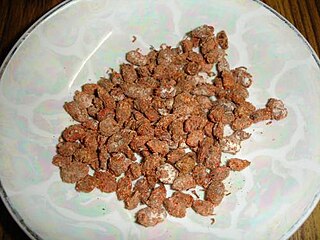
Unani or Yunani medicine is Perso-Arabic traditional medicine as practiced in Muslim culture in South Asia and modern day Central Asia. Unani medicine is pseudoscientific. The Indian Medical Association describes Unani practitioners who claim to practice medicine as quacks.

Siddha medicine is a form of traditional medicine originating in southern India. It is one of the oldest systems of medicine in India.
The National Integrated Medical Association (NIMA) is an Indian non-governmental organisation of general practitioners educated in integrated system of medicine which includes study of Modern Medicine and knowledge of ayurveda/unani/siddha with scientific approach.
Bachelor of Ayurvedic Medicine and Surgery (B.A.M.S.) is a professional degree focused on Ayurveda offered in India, Nepal, Bangladesh, and Sri Lanka.

Homeopathy is fairly common in some countries while being uncommon in others. In some countries, there are no specific legal regulations concerning the use of homeopathy, while in others, licenses or degrees in conventional medicine from accredited universities are required.
The Ministry of Ayush, a ministry of the Government of India, is responsible for developing education, research and propagation of traditional medicine and alternative medicine systems in India. Ayush is a name devised from the names of the alternative healthcare systems covered by the ministry: ayurveda, yoga & naturopathy, Unani, Siddha, Sowa Rigpa, and homeopathy.
Dr. Sarvepalli Radhakrishnan Rajasthan Ayurved University, formerly Rajasthan Ayurved University, is Ayurved university in the state Rajasthan. The university situated in Jodhpur was founded on 24 May 2003.
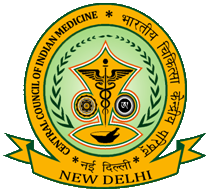
Central Council of Indian Medicine (CCIM) was a statutory body under the Ministry of AYUSH, Government of India between 1971 and 2021. The CCIM was set up in 1971 under the Indian Medicine Central Council Act, which was passed in 1970. It is one of the Professional councils under University Grants Commission (UGC) to monitor higher education in Indian systems of medicine, including Ayurveda, Siddha, Unani and Sowa-Rigpa.
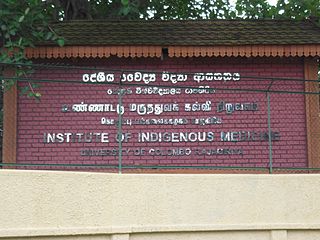
The Faculty of Indigenous Medicine of the University of Colombo, specialising in Ayurveda and the Sri Lankan traditional medicine. Founded as the College of Indigenous Medicine in 1929, it became part of the University of Colombo adopting its current name in 1977. It is a premier center of undergraduate and postgraduate study and research into Ayurveda and Indigenous Medicine and Healthcare.

Central Research Institute of Unani Medicine or CRIUM Hyderabad, established in December 1971, is an Indian Government-sponsored Unani medicine research center and out-patient clinic located in Hyderabad, India. The institute was upgraded to National Research Institute of Unani Medicine for Skin Disorders (NRIUMSD), by Shripad Naik, Minister of State (IC) for AYUSH in November 2019. The Institute is well known for its successful treatment in the skin condition of vitiligo, treating more than 150,000 patients.
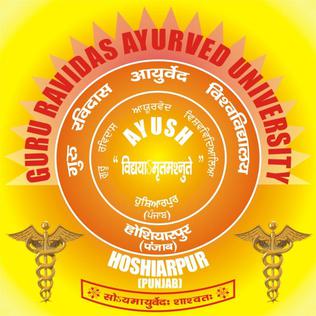
Guru Ravidas Ayurved University is a public university for Ayurveda, Yoga & Naturopathy, Unani, Siddha and Homeopathy located in Hoshiarpur, Punjab, India.
The National Council for Homeopathy (NCH) is an autonomous body constituted to regulate the education and registration of homeopathic medical practitioners in Pakistan.
Krishna Chandra Chunekar was an Indian ayurvedic practitioner and writer, known for the books he published, especially the translation of Vedic literature on herbal pharmacopeia. The Government of India awarded him, in 2013, the Padma Shri in medicine, the fourth highest civilian award, for his contributions.
Vaidya Balendu Prakash is an Indian Ayurveda practitioner. He is a former physician to the President of India and the founder of Paadav, a specialty Ayurvedic hospital in Dehradun. The Government of India awarded him the fourth highest civilian award of the Padma Shri in 1999.
Paneenazhikath Narayana Vasudeva Kurup was an Indian Ayurvedic practitioner, researcher, writer and the founder director of the Central Council for Research in Homoeopathy (CCRIMH). He is a former vice chancellor of the Gujarat Ayurved University, Jamnagar and a former advisor of the Indian Systems of Medicine and Homoeopathy (ISM&H) of the Ministry of Health and Family Welfare. He has published several articles and a book, A Handbook on Indian Medicinal Plants, on the traditional Indian medicine system, The Government of India awarded him the fourth highest civilian honour of the Padma Shri, in 2005, for his contributions to Indian medicine.
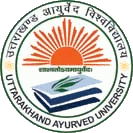
Uttarakhand Ayurved University is a public state university located at Dehradun, Uttarakhand, India. It was established in 2009 by the Government of Uttarakhand through the Uttarakhand Ayurved University Act, 2009. It focuses on teaching and research of Ayurveda, as well as other areas of AYUSH. Sunil Kumar Joshi was appointed vice chancellor in 2020.
Dr. B. D. Jatti Homoeopathic Medical College, Hospital and Post Graduate Research Centre is an organization under the Ministry of Ayurveda, Yoga & Naturopathy, Unani, Siddha, and Homeopathy, Government of India. It is affiliated to the Rajiv Gandhi University of Health Sciences, Bengaluru, Karnataka and conducts the graduate degree course in Homeopathy and post-graduate degree courses in Homoeopathy. The college is attached with 60 bedded hospital.

The standard entry-to-practice degree in modern evidence-based medicine in India is the Bachelor of Medicine and Bachelor of Surgery (MBBS). Alternative systems of Medicine in India are Ayurveda (BAMS), Unani (BUMS), Siddha(BSMS), Homeopathy (BHMS). M.B.B.S. a credential earned upon completion of a five-and-a-half-year undergraduate program. The curriculum is divided into one year of preclinical studies in general science subjects and three and a half years of paraclinical and clinical studies, followed by a one-year clinical internship. Before beginning the internship, students are required to pass several examinations, the final one of which is conducted in two parts. Postgraduate education in medical specialties typically takes 3 additional years of study after the MBBS and concludes with the award of a Master of Surgery or Doctor of Medicine(MD). Postgraduate diplomas in medical specialities may also be awarded upon the completion of two-year training programs. After that a person can further get a degree in superspeciality in his or her respective branch after successful completion of 3 years of superspeciality in a medical college.










